By Alexis Jones
Photography by Brett Carlsen
Cowhide decorated horns blared through the sanctuary of the bone-white colored church during Sunday service. A young girl in red flannel and jeans kicked off her snow boots and ran down the red carpeted aisle to join the rest of the choir on stage. Yeehaws reverberated off the walls as the celebratory praises began and the pastor started laying hands on congregation members as they dropped to the floor one by one, while deacons covered them with blankets. This is an average Sunday morning at the Lighthouse Church of God in Mexico, New York, some six miles from the Lake Ontario shoreline.
When the worship team wrapped up their set, the pastor came to the front of the church and began his sermon. This week’s topic: guns. The Bible said to love your enemies, and the commandments say thou shalt not kill, but the Lighthouse Church of God is arguing for an amendment — the second, that is.
Shortly after the church shooting in Sutherland Springs, Texas, in early November, in which 26 people were killed, the Lighthouse Church rearranged the letters on its welcome sign to read: “We’re locked and loaded — this is not a gun free zone.”
“If one person had a conceal and carry at the Texas church shooting, how many people would have been saved?”
Just like Kinney Drugs Store and Floyd’s Hometown Garage on the next street over, the church is a fixture of Mexico, New York, population 5,100. Lighthouse Pastor Ronald Russell said the welcome sign is anything but a surprise for members of the evangelical church and other town residents.
“We haven’t been a gun-free zone for years,” said Russell. While the sign may be new, the pastor emphasized the church’s common custom of having armed members of the congregation. “We have been armed and people know it.”
Russell is among the 59 percent of white evangelicals opposed to stricter gun control, according to the Public Religion Research Institute. Unlike their religious counterparts, including the 76 percent of Protestants and 67 percent of Catholics who are in favor of more gun control, evangelicals like Russell are arguing the only solution to mass shootings at the moment is “preventative gun possession.”
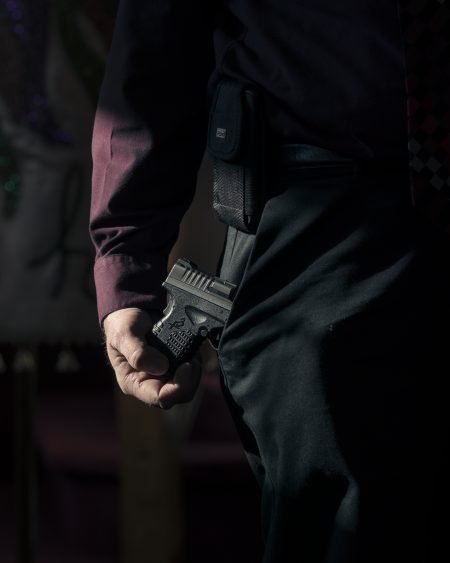
A parishioner at the Lighthouse Church of God.
In a study done by the Harvard School of Public Health in 2014, the frequency of mass shootings tripled from 2011 to 2014. One would think those professing Christianity would be more concerned with practicing peace and nonviolence, rather than arming themselves with weapons. However, several religious leaders like Russell say they don’t know what else to do and it’s the only way to protect their congregation.
“If anybody can show me any other way to protect 40 to 60 young people when you have a crazy coming in, I’m all for it,” Russell said.
At the Sunday service I attended, Pastor Russell stood in front of a congregation of about 70 people and made his position on guns perfectly clear. “What would happen if we gave up our guns? You don’t have no good guys to stand up to the bad guys,” he said, answering his own question. “If one person had a conceal and carry at the Texas shooting, how many people would have been saved?”
Churchgoers nodded in agreement — one man even mimicking a gun with his thumb and index finger, shooting it toward the roof of the sanctuary.
***
Professor Gustav Niebuhr, director of the Carnegie Religion and Media program at nearby Syracuse University, said that in his 20-year career focusing on American religion, he’s never seen such a strong statement and political response from a church as the one made by Lighthouse.
“I’ve never heard of anything like this before. What you’re describing is not in any doctrine. It probably started with a certain conviction that they applied favorably to support their beliefs,” Niebuhr said.
Niebuhr believes that the political and outspoken beliefs on gun ownership made by Russell and the other 59 percent of evangelicals is based on location.
Several religious leaders like Russell say having guns in the church is the only way to protect their congregation.
“A lot of it is so dependent on geography,” Niebuhr said. The Great Lakes region, for example, has a thriving hunting culture. Pennsylvania, Michigan, Wisconsin, and New York all have high numbers of licensed hunters, with Pennsylvania and Michigan boasting the second- and third-most licensed hunters in the nation.
Niebuhr went on to discuss factors other than geography. For example, Niebuhr pointed out members of predominantly black religious denominations, and how many are not going to be in favor of gun rights because they have seen the effects guns have had on their communities.
This rang true among Pastor Kenneth Reed and First Lady Saundra Reed of the Greater Evangelical Church of God in Christ, in Syracuse. “We are classed sometimes with Southern evangelicals, which are mostly probably Caucasian,” Reed said. “Though we are evangelical in nature and protestant, our community I believe is for stricter gun control from what I know. Which again begins to divide the issue itself into a political thing — Republicans and Democrats, and then race as well.”
Pastor and First Lady Reed have never felt the need to purchase a gun. However, Pastor Reed said he does know of people in his congregation who come to church with a conceal and carry weapon. But both said they would not depend on someone in the congregation with a gun to be their saving grace in the event of a mass shooting.
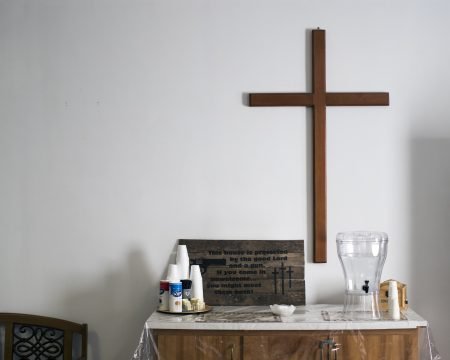
“This house is protected by the good Lord and a gun. If you come in unwelcome … you might meet them both.” A sign in the lobby of Lighthouse Church of God.
Niebuhr also addressed the 67 percent of Catholics who are likely to vote in favor of more gun control. Niebuhr said this is most likely dependent on the Pope’s stance at the time. Jeremiah Deep, Catholic campus minister at Syracuse University and Hendricks Chapel, agreed with Niebuhr.
“The biggest thing is Pope Francis. He has been a huge advocate for stricter gun policies and actually he is very much anti-violence and anti-guns,” Deep said. “It really starts from the top.”
Even without Pope Francis’ overt statements on gun ownership, Deep is skeptical about Lighthouse. While Deep said he respects the second amendment and doesn’t have a problem with people who own guns, he also believes that telling people they have a gun loaded and ready to go would detract them from coming into the church. “If I was going into a place knowing that the people in charge of that building had guns, I would be hesitant to go in,” Deep said.
Father Gerry Waterman, who works with Deep at Syracuse, said plain and simple, guns don’t belong in the church. Waterman recalled the Sunday before Thanksgiving, shortly after the Texas shooting, visiting another friar in Point Pleasant Beach, New Jersey. “The police called all the pastors together because of this gun craze and said here’s what we want you to do. You have your doors open and your people are being welcomed into mass, and then when mass starts, you lock the doors.”
Waterman looked at his friend and said, “I can’t do that. If I were here, I would have to fight that. I believe in being welcoming. No one can dictate safety or when you’re going to be safe.”
Waterman argued to the officers that so many people come late to mass and that it would be unwelcoming to lock the doors after a certain time. Waterman said the officer’s solution was to place a sentry guard at the door.
The pastor looked at the officer and said, “You’re going to have a sentry outside — armed? With a rifle? With a bullet proof vest?”
Waterman continued: “Yes, that one person who’s not one of yours, who is coming to harm your sheep, you don’t know they’re there. But I’ve got to trust God. I’ve got to trust God that if I err on the side of welcome, God will protect us. I know it sounds like witchery and foolery, but I have to believe it.” When it comes to guns in the church, Waterman said, “it’s oxymoronic.”
***
The FBI received 203,086 requests for instant gun background checks on Black Friday, setting a new single-day record, according to USA Today. But the number of guns purchased that day is most likely even higher, because this doesn’t account for the quantity of guns each individual purchased. It also doesn’t account for the unlicensed private sellers, who in 39 of the 50 states are not required to perform background checks unless their state law requires it, according to the Giffords Law Center. In a study done by the American Public Health association which combed through 30 years of homicide data from 1981-2010, it was discovered that for every 1 percent increase in a state’s gun ownership rate, there is a nearly 1 percent increase in its firearm homicide rate.
But statistics like this won’t stop Christians like Matthew Mallory from carrying his gun.
Matthew Mallory, who teaches gun safety and self defense, said many churches have been coming to him, looking to be trained on how to safely carry and shoot guns in church.
Mallory disassembled his pistols one by one, removing their ammunition and setting them on the table as he recently prepared to lead his Monday night pistol safety class at Runnings, an outdoor store in Liverpool, NY, some 25 miles south of Lighthouse. The U.S. Army veteran is founder of Public Safety and Education — a program for gun safety training, self-defense class, NRA certifications and more.
Recently, Mallory said many churches have been coming to him, looking to be trained on how to safely carry and shoot guns in church. But even before the Texas shooting, Mallory has always felt comfortable and safer bringing his gun to church.
“I’ve brought my gun to church constantly, many years over,” said Mallory. “My church has actually asked me to come in and talk to the staff about how important it is to be trained so you know how to use the gun, but also to have the gun on you so that if anybody does decide to come into the church and kill anybody, we can defend ourselves.”
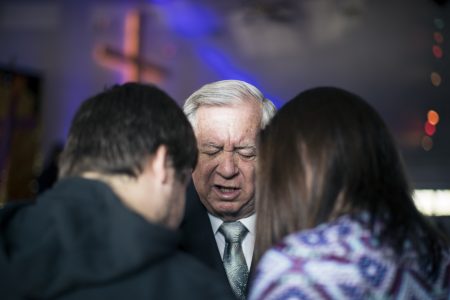
Pastor Ronald Russell speaks in tongues while praying for a pair of his parishioners during services at Lighthouse Church of God in Mexico, NY, on January 28, 2018.
Mallory has even designed a special program for church security called Sheepdog. On his website, Mallory quotes 2 Timothy verse 3: “There will be terrible times in the last days.” The message continues: “These are terrible times and it is time for Sheepdogs to solidify and define our calling to serve the LORD. It’s time to renew our promise and commitment to serve Christ and the Church with all our hearts, minds and strength.” For Mallory, this means being armed in church.
Mark Rogers, founder of the site and online community group called Christian Gun Owners, echoed Mallory’s sentiments.
On the welcome page of his site, Rogers wrote, “There is a huge American community of Christians who know this country was founded on the principles of the Bible and under the guiding hand of an almighty God” and “that community believes that the U.S. Constitution and the Bill of Rights were a result of that guidance.”
When asked why he wrote that, Rogers said, “That observation attempts to free up Christians who are convinced that firearm ownership for self-defense is somehow bad. It allows them to see the issue from a standpoint of law and order, rather than some kind of violation of Biblical values.”
Meanwhile, back at Lighthouse Church, Pastor Russell finished his sermon that Sunday morning by listing off the names of the most notable mass shootings in the past 10 years: “San Bernardino, Sandy Hook, Virginia Tech, Texas, Las Vegas…” The list goes on and our country still remains divided over the issue of stricter gun control.
As for Russell, he’ll remain armed until a new precedent is set. “If you have all these politicians give up their armed security, I’ll give up mine,” Russell said.
To support more articles like this one, become a member of Belt Magazine starting at just $5 a month.
Alexis Jones is a freelance journalist covering religion and culture. She’s based in Syracuse, NY.
Brett Carlsen is a documentary photographer based in rural Pennsylvania.



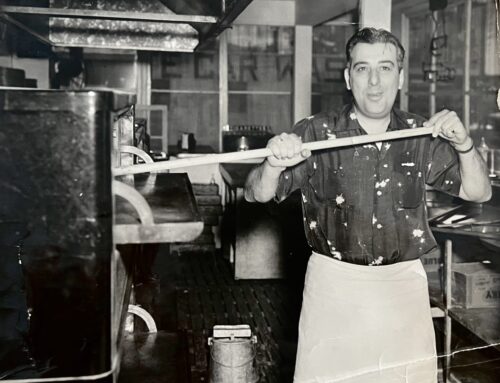

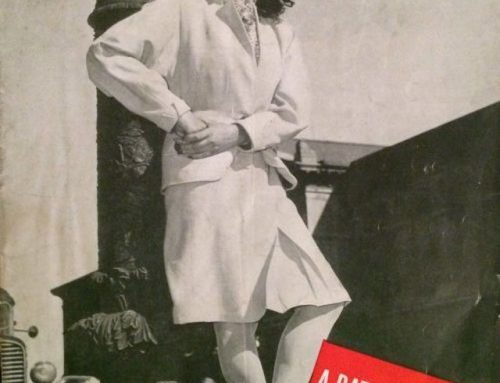

good word, a lot of people do not like law enforcement( who carry guns) until they need some help, Luck and load be ready in season and out